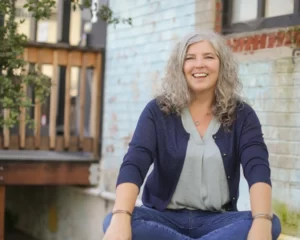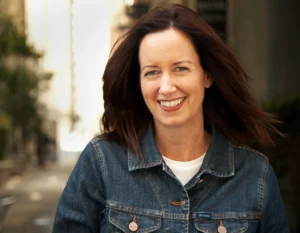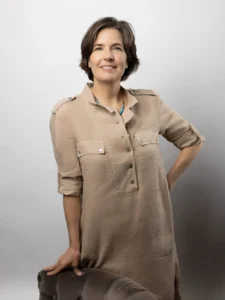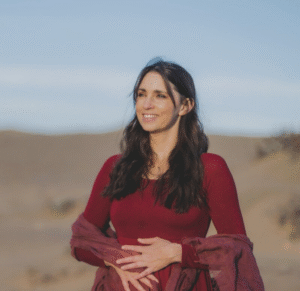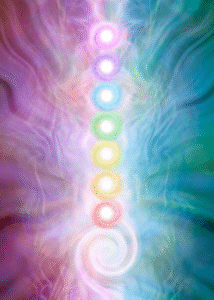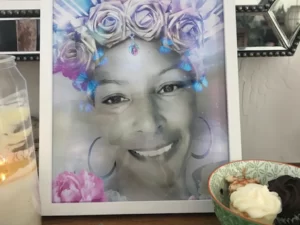Amy is back for this episode of LaidOPEN and she has questions for Charna about dating and sex. Together the two of them discuss defining sex in broader terms than Penis In Vagina (PIV), the importance of mindful self touch within self-care, dating in the 4th dimension and why Charna’s writing her book. Charna also leads a guided embodiment meditation in length, width and depth.
Amy MacClain is a social storyteller and healer, committed to building a more resilient, equitable and accountable world. She trains, consults and designs to help others create change that lasts and is relevant in real life – raising consciousness, building community and bringing justice into unstoppable action. She does this by narrating the healing journey in song, coaching white folx to dismantle systemic oppression and offering engaging interactive experiences within which we can heal and explore.
Charna Cassell photograph courtesy of Candace Smith.
Amy MacClain photograph courtesy of Andrea Scher.
Show Notes - Dating in the 4th Dimension
Welcome back to Laid Open podcast. I’m your host Charna Caselle, a licensed Marriage and Family Therapist and master somatic coach. I’m joined today by Amy McLean. She’s a master facilitator, executive coach, curriculum developer and most importantly, one of my best friends.
So, what do you think we should talk about today?
Should we talk about dating?
Sure.
I am, like having moments of having crushes on people where I see them and I’m like, ooh, and that and something. I’m like, hey, that’s okay. And then I literally visualize the first date and having to talk to them. And I’m like, oh, no, no, no. I ain’t got time for that.
What is it about the I understand that the thing about time and prioritizing and ranking, what’s worth your time? But what is it about the first conversation that puts you off?
I just don’t want to have to work hard for people. I just want to take care of myself. That’s what’s happening right now. I’m having to break through self care. Is my sexual freedom.
Absolutely. I mean, I think wherever you are, I’m a big fan of periods of celibacy, and being monogamous with whatever creative project you’re working on. Men taking the time to always be in choice around what your priority is, is there’s something about sexual energy, like, I’ve heard that your root chakra, we’re going to talk about chakra as your root chakra is where your sexual energy is, when your root your first and second chakra is and that when you have sex, you’re kind of releasing that energy out. As opposed to like building that energy up.
That depends on what kind of sex you’re having.
Whoa, this is gonna get good right here. Okay, elaborate. just mean that there’s, if you’re engaged in tantric sex, right? There’s different kinds of sex. So we often think of in heteronormative culture, P IV, is what I call being as in vagina sex, penis and vagina sex, right? So if a penis doesn’t go into a vagina, it’s not considered sex, which, coming from a place of identifying as lesbian for decades. I don’t think it’s true. And so there’s so many different kinds of sex and bringing your energy I mean, yes, there’s this idea in like Taoism, for instance, not ejaculating, right? Like you want to build up your Jing and that when a manager circulates. He loses his energy. Right? So stereotypically, a guy comes in, then he’s like, Oh, Baba. really experienced that? Yes, I think most people have. So doesn’t have to look like that. You can actually, as a man, you can have an orgasm and not ejaculate, you can re cycle and circle your energy. And you can draw it up and blend it with the other person’s
Whoa, can you say more about how that might happen? Because you’re saying that and I’m like, I’m like to walk into a bar.
Like in the twilight zone, these energies move.
I think there are ways that you can move energy as if you’re your own practices, right? You can be cultivating your own energetic strength, and energy follows intention. I’ve heard that wherever you put your attention, your energy goes, right. So right now go ahead and put your hand on your knee. Hands on my knee. Right? And do you feel your knee more or less than you did a second ago? Oh, more? Oh, yeah. How does uni feeling warm? My hand is warm.
So energy follows attention. And so when you start to train, where do you put your attention in certain places, you’re training your energy to go there. Okay, so you can do that on your own. And someone could be in your your actual physical space or they could be in a different space. Right? They could be in a different country. And you could be doing something at the same time and feeling your on another person’s energy or you could literally be sitting on each other’s laps or laying in bed together, or sitting across from one another meditating and intending to dry your energy up from your sacrum, from your pelvis all the way up to the top of your head and cycle back down.
I’m just curious, because I know that you have your clients practice different things. I’ve heard you say things like masturbation homework, and I’m curious if those are ways that they’re training their energy to flow more towards their sexuality.
Absolutely. And so, you know, one of the things that I see is for most women that I work with, there’s no version of masturbation homework. Most guys will take it on like champs because they’ve been conditioned to be okay with masturbating. And so it’s trickier, right for so many different reasons. There’s, you know, it’s like permission, what’s going to come up if there’s trauma, you know, pressure to get it right. But really like feeling yourself, it’s a way to feel yourself and then a step back from masturbation homework could be something, you know, like, how do you play lotion? When you get out of the shower? How can you touch yourself? And maybe it doesn’t have to be your genitals. But how can you touch yourself and be conscious and direct your attention, there was a period where I had a bunion forming on my foot. And so I start giving myself foot massages every night. And then if you know anything about reflexology, that you have all these like pressure points in your feet that correlate with all the organs and parts of your body. It was just a really nice way to connect with myself every night like good smelling lotion, rubbing the feet.
I’ve also heard you say that our sexuality is connected to to everything else. It’s a microcosm for everything else. And I think that I personally experienced such the societal training, right? Which is like, Okay, you’re gonna go home, you’re gonna cook dinner, you’re gonna eat dinner with your family, and then you’re gonna clean up and then you’re gonna sit down in front of the TV and watch something and then you’re gonna go to bed. Whoa, someone takes time to give themselves a foot massage at night. Okay, this is good, countercultural training.
Well, you know, it’s also a privilege, right? Like, some people are working for jobs, and they’re too exhausted to do that. You know, so I don’t assume that that’s something that everyone has access to, or energy and time to put towards when I worked at Good Vibrations. I lived really close to the store and I could go home on my lunch break and watch a porn and masturbate while I ate my lunch. My homework was basically to get to know the material and the products. So I masturbated a lot. And it was literally kind of part of my job. Wow. So when I worked at good vibrations, we had a free box which was full of unused, a slightly damaged like, let’s say there was a until dough, silicone dildos or like, you know, $80 a really expensive, but they’re up for grabs. So I had an abundance. I have had multiple vintage suitcases filled with sex toys. And when I moved from San Francisco to Oakland, I decided to have a garage sale near Dolores Park. And I spread out all my wares. And I became a little notorious because then I ended up in grad school. And there was somebody came up to me and he’s like, I remember you here are selling dildos on the sidewalk nearby, right? It’s the best garage sale ever. And I made a killing, I made a good amount of money at that garage sale.
You’re like, this is what it really means to buy, right? Let’s talk about sex. They talk about you and the
good things and the bad things of dating. Maybe, oh, I have got a story about salt and pepper. Okay, okay. When I was right out of college, I had a little boombox. I was getting out of a car and had a little boombox because there’s no tape deck in this mercury marquee. And I had salt and pepper playing. And I put the little boombox in the top of my car. And there was an old man out in front of his antique shop. And this is an amp. This is in Northampton, Massachusetts. And he was like, Yeah, call that he was sick. And I was like, Oh, actually, yeah, I do. And he’s like, talking like that. And I was like, well, that’s not really that much different than Charlie rich singing about let me pet your poodle or, you know, whatever song there would be like, things were really coated back them. Let me pitch a poodle. Bob Shoop. I mean, like, there’s literally now that I have a poodle. I understand why. It’s so nice to bet them because they feel really good. But that’s not what he’s talking about. It was really awesome to have this grumpy old man. Suddenly look at me smile and say, yeah, got a point there. I totally got it.
It’s awesome. I used to have these conversations at work with a friend who actually had a lot more sexual explorative Ness about that than I did. And there were a few of us at work, who would talk about it, and a couple of them would give each other a little crap about it, you know, they would just make jokes about the dates they would go on, or the guys I think were cute, or the sex they might be having, or the type of body or whatever. And, you know, I just would be working really hard. And I’d be like, I’d make a joke about being asexual. And I made so many jokes about it, that one of my colleagues who’s queer was like, you know, that’s an identity category. I could just, I could, I could have you, like, meet up with some people. I’m like, I don’t think I’m ready to take that.
Commitment. But you know, you don’t I mean, there’s sometimes there’s the safety and comfort and community and labels and dating. And other times it can feel like it’s boxing you in in a way that doesn’t feel good. Feels restrictive. Yeah, right. Now, I don’t want to be boxed in again, I, you know, I think I said this before, but there are periods where people, sometimes people are just straight up asexual, and that’s cool. And then there are other times where people go through periods where sex is off the table for whatever reason, right? Whether it’s about a healing process, whether it’s about a creative process or a spiritual process. Right, there’s not one way to be. And that’s all right. Different things take priority at different times. I mean, one thing I think about is just that your sexual energy is your lifeforce, or your chi or your key, your Ching, there’s all these different words for it. And you know, for me, like after taking a dance class or something, and my energy is moving in a certain way in my body, and I feel alive and it feels sensual, and it feels good, or I feel strong. It’s all the same thing.
You have a book coming out, let’s just talk about it for a minute. Why are you writing this book, writing for me was a resource even as a little kid. And reading was a massive form of resilience for me, like reading books by people like Alice Walker, Toni Morrison, Maya Angelou, when I was a 10 year old, and knowing like, Oh, these women wrote these books, they survived hard experiences, these books meant a lot to me. And they were models for me. So I always loved writing. So there’s that. But there’s also you know, it’s a process of healing and integrating and making sense of, I think, for me, as a young person, I didn’t have any continuity or consistency in my life from the outside, I had to create all my own internal structure. And the first time I started to write a book, I was writing a memoir. And this is like, five, six years, six years ago. And I started to get really sick. I’m just remembering these experiences from childhood caused really intense inflammation in my body, I couldn’t eat anything, I was having an allergic reaction, to broccoli to salmon to like, all these basic things that are supposed to be healthy for you. So I stopped writing that book, because I realized like, even though I had some kind of compulsion to write and make sense of things, one of the things that I saw in the process of writing that book was how disjointed things are the way in trauma, brain trauma, memory comes in all these fragments. So they’re all these fragmented pieces that were so vivid in my memory, we, I would share my writing within the group writing group I was in it made sense to them. And then I saw like the person who couldn’t understand or follow what I was writing, so that was really, it was a useful thing for me to see. And so then it got to the point where I do think that my personal story and healing process is useful with clients. So I’ve included some of that but really what feels good for me as you know, my work is my is a form of resilience for me. Right? It’s a place I feel strong, I feel good, I feel creative, and, and vibrant and alive. And dynamic. What I’ve come to I’ve pulled from so many different directions and there and sexual trauma I’ve come to see is so much bigger than sexual assault, and child sexual abuse, right? There’s so many subtleties to the things that inform your sexual expression and shape who you are, and, and impact your sexuality growing up, where there’s a mental illness in the family, or racism and sexism and all and homophobia in your culture or a certain religion, all these things can cause sexual trauma. And I think that with less education, certain therapists can see certain symptoms and decide, Oh, you must have been sexually abused. And I think that’s not accurate. And they can have people think that certain things may have may have happened when it’s like growing up with a parent who is mentally ill, and you have to keep that secret and you don’t get to have any needs. How could that not affect how you show up in your sexual relationships as an adult?
So do you see that with your kids It’s like they come in for one. They come in for one thing, like they come in for something sexual. Like, I don’t feel like having sex with my boyfriend or you know, for. For me, I had a partner once who just like, felt all this stuff in the stomach. And when he was feeling the stuff in his stomach, he just couldn’t he couldn’t relate to sexuality at all, he didn’t feel sexual. That’s why people come in for that. And then you find out that actually really what they have to do is go back through other trauma or specifically, I just want to address the stomach thing that’s really interesting. So we mainly feel our emotions in our torso, our chest and belly. There’s a lot of information there. I mean, we do feel sensation out there, in our extremities and other parts of us but but primary emotions often are felt in our gut, right, our heart and so sometimes, you know, his stomach, right, that’s, that’s second and third chakra if you want to go there. Right? Your second is all about connection other people sexuality and connection to your creativity. And third is about which is where your solar plexus is, that’s your personal power and your alignment with yourself. Like when you get a gut feeling about something, right. So for me, I get curious if someone came in and was talking about what was happening in their belly. What what had just happened in their life, what what, you know, that had happened a couple hours earlier, what emotion they were feeling, and I wouldn’t be surprised if there was something that felt disempowering. I had a client who came in who had something called vulvodynia, there can be a lot of pain in the opening of your vulva. And it can be in the the lips themselves, or it can just it can be in the opening, and so that anything inserted inside any contact or penetration can be incredibly painful. A symptom like that, you know, sometimes that can come as a result of someone’s own sexual trauma, but it can also be vicarious trauma, it could be that something happened to somebody that they cared about in their family.
Do you know what was happening with this person, I do know what was happening with that person for that person, one of their relatives had been raped. And when they found out about it, there was, I believe, a feeling of disempowerment and fear that then permeated how they they move through the world.
So as one of the reasons why you wrote this book, to just sort of speak all the things that you moved through to find the level of sexual freedom that you have today, so that people can have a record or a roadmap Yes, for myself, as well as not just what I’ve moved through. But what I’ve seen other people move through, really, and to really get a sense of that there’s, there’s so many different things that can be the source of what I call sexual trauma, or there’s some kind of restriction and the energetic flow in your body as a result of terror as a result of feeling, incapable of protecting yourself and feeling unsafe. Right.
I’m curious to go into more technical direction, because I feel like maybe people would want to hear, you know, what are the symptoms? What are the things that people would be experiencing? That might be an indicator of their of trauma in this area? Like, what are the normal things people come into you with? I mean, do you have a top 10 list? Or is there a, you know, like, yeah, so sometimes people come in to me, and it could be, could be a lack of libido, it could be being pre orgasmic. It’s often a challenge in a relationship, and that there’s some kind of pressure in there for the relationship to work. So less motivated often by their own sex drive and desire than they are to take care of their relationship.
What is pre orgasmic? Can you just say what that means for your cosmic means? Not having orgasms? Okay, so in order to have an IT doesn’t mean coming too fast, which is what I thought, yeah, right. That would be premature, cuz old school was talking about his premature ejaculation, right pre orgasmic for women. Right? I haven’t, I haven’t had any I have I’ve had, I’ve worked with men who won’t allow themselves to come either because they’re Taoist or because they when they were sexually abused, and they ejaculated, there was so much shame that they don’t allow themselves to come now. But with women pre orgasmic is they have yet to have what Masterson Johnson called an orgasm. This big, big, big, big build up and then fall. But pre orgasmic in order to have an orgasm. You need to be able to let go, you need to be able to relax. And if and this is comes back to that whole conversation about microcosm, right? So if in your life, you need to maintain control, if control is your best friend, then like for instance, I’ve met people who’ve never been drunk or stoned. And, and growing up in a family where there was a lot of addiction. That’s amazing to me the first time I was drunk, I was two years old. Yeah. Right. And so the idea that someone would make go through their whole life without that, it’s like they really liked control. Right? So then do you take that to the next level, like, even around your sexuality, you have to get out of your head and into your body, and feel your sensations and surrender to what is building in you, and not need to stop it in order to have a more traditional orgasm.
Okay, so I heard lack of libido I heard pre orgasmic, meaning haven’t had one yet, I heard premature ejaculation mean, meaning had went too fast, I heard control issues, coming back to what has people come in anxiety, insomnia, physical ailments, right? So so a history of sexual trauma, or any kind of trauma can cause autoimmune conditions and chronic pain in the body. So sometimes their body is bringing them in, literally depression, lack of confidence, there’s lots of different kinds of symptoms. I mean, I could I feel like I could just kind of go on. I mean, there’s, there’s, yeah, there’s a lot of things. But often, what you were saying earlier, which is important is people will come in with this dominant thing. So it could be I want to be able to have pleasurable sex with my partner. And right now I have painful sex, and then what we get to as we get to all these other topics, and we get to the root of it, which is what was happening in your family system, where you couldn’t let go of control, you had to take care of your mom instead of her taking care of you. And, you know, what are the other dynamics that are going on, that are affecting how you show up in this relationship? And what you and what kind of pleasure you do or don’t allow yourself to have?
Yeah, so if the first step to sexual freedom, which we talked about is awareness, then maybe it would be good to think about if you’re listening to this podcast, like, where are you in this moment? Like, where would you put yourself on the spectrum of sexual freedom? It’s like you feel totally free, like you can, you’re able to tolerate all these different sensations. And in fact, you’re able to navigate yourself towards experiencing more sensation or less in a particular moment, you feel really free to say yes or no, or like, you know, as the switch turned off, as it says, in the in the opening liner, and like, you know, where maybe you’re just not ready to even consider it?
Well, and then the challenge often comes, what often brings couples in to see me is that they’re on different pages. Right? One person, and, you know, I actually had a couple I worked with a long time ago, where her switch was pretty turned off, and he was wanting more sexual engagement. And yet, what’s interesting is often, like, even if you say you want something, you may not be ready for it. Right, there is a way that his nervous system would actually get overwhelmed by too much sensation really easily. So I think if he actually had this ravenous wife, it would blow them out. And not in a good way. You know, so But anyways, a mismatch in sexual drive is, or were the kind of like, in the lesbian world, we called it lesbian bed death, right? Where there’s not enough polarity and not enough energy between two people to keep the certain kind of aliveness and desire flowing, the sexual chemistry as it were. Yeah. So if awareness is the first step, and we find ourselves somewhere on this continuum of nothing to freedom, and I think that somewhere in that continuum of freedom from nothing to full freedom, and I think somewhere in that continuum would be like over obsessed, but that’s before freedom, like over obsessed is not freedom.
Right? Well, that’s That’s it, you know, you’re talking addiction, you’re talking about being gripped and preoccupied and compulsively driven around something that’s like, you know, porn addiction or sex addiction. That’s yeah, that’s not freedom. It’s not choice
I like that word. When you say choice full. Yeah. So then if we found ourselves in that space of awareness, and we’ve started to tune in to our own body feelings, and we’re maybe feeling ourselves a little bit more and we’re understanding so here’s the thing, healing is not linear. These are things that you will do repeatedly and you will do in different orders. So embodiment, embodiment, when I say embodies that mean, P IV, does not. P, I or V. Okay, being able to be in all parts of your body, and feel your sensations and enjoy your sensations. That’s embodiment. Right. So having awareness of where your arm is in space, I know that when I first started doing like Pilates or yoga, I needed physical feedback to even know where a limb was located, parts of your body could be numb. It’s very common for people to live from their neck up in this culture definitely like from the waist up, occupying your pelvis is taboo for a variety of reasons. So when we have a certain kind of trauma, for instance, it could be sexual or non sexual, like someone could be overweight and have been teased for that. And then their belly goes numb, like their whole torso, they can’t feel their belly and their guts in there. Which, again, remember is your connection to your personal power. So then they could get disconnected from their personal power and their sexuality.
Yeah, it’s interesting, because I’m an athlete, former athlete, let’s be honest, I’m a former athlete. But what I noticed about myself is that my body awareness is really powerful, like when I’m in the gym, so when I’m working with my trainer, he can ask me to tune into certain muscles, and I literally can feel the small muscles of my shoulder or I can feel the lower abs, the mid abs, the upper upper abdominals, I can, you know, I can tune in and feel all of that. But then when I’m just walking through my day, I feel like I generally don’t allow much of that to impact me, mostly, I feel from my Yeah, from my boobs up.
So that’s brilliant. First of all, great awareness, Amy, tits up, okay, it’s just walking through the world isn’t always a safe place, especially as a woman, right? Or a person of color, or a gay man, or, you know, and so, to go numb, there’s intelligence there. And we numb ourselves and our families of origin when things are not safe for a variety of reason, if there’s violence, emotional or otherwise, so our habits take over, and we go unconscious, versus you’re in a gym, and someone’s just helping direct you and bring your consciousness to those places. Like I said, bring your attention to your hand on your knee earlier, right. So the more that you train yourself to become aware of, and there’s grounding exercises, and that’s something I could potentially guide us through that build body awareness, like repetition, and practice practices towards sexual freedom is really what it is, in my mind. It’s like things that you need to do on a regular basis. Because when you stop something, even if you’ve meditated every day, for two years, our habit is to default back to the neural pathways that are the strongest or the ones that are going to take over, right. So that’s why repetition creates new neural pathways. It’s just like, it reinforces them reinforces them.
So let’s do a practice. Let’s do an embodiment practice.
Okay, you can do this when you’re seated, or standing either way, you could do it laying down, I’m going to just for the ease of of giving one direction, I’m going to say that you’re standing. So let’s say you stand up, okay. Okay. And go ahead and place your hand underneath your belly button. And so this practice comes from the Strozzi Institute, Richard Strozzi, Heckler and Stacy Haynes were my teachers there. And this practice is a really important practice in coming back into your body and reclaiming your body as a safe place to exist in potentially a pleasurable place to exist. Let your feet be hip distance apart, notice if your toes are turning out or turning in, or if they’re parallel. And go ahead and breathe into your hand underneath your belly button. And if you’ve done martial arts, this is called your lower dantian. And you can think of this as a place this is your home.
So when you breathe into your belly button, I hear people say that all the time, and I just want to be clear here. So do you mean like breathe and let my belly expand, let your belly expand, breathe under your hand, let your hand let your belly move your hand. So while you’re doing this, you want to pay attention to sensation, right? So sensation can be heat. It can be coolness, it could be tension, or blankness. It could feel like a pit in your stomach or a boulder on your chest. So there’s a texture to sensation. So you’re paying attention to sensation, emotions that may arise. thoughts and memories. So when else have you felt this particular sensation or emotion and images might arise as well. So thinking about all these things are allowing them and you don’t have to worry or that you’re getting distracted by them. Just allow them to be there. So letting your belly be however it wants to be bringing the breath into your hand and breathing into your feet. Imagining your feet can open wide and As you inhale, you draw energy up from the earth, all the way up the length of your spine and you exhale, and it all flows back down. So I’m actually blending my own practices with this rosy stuff. So it’s not pure Strozzi. So what Richard taught was that we organize ourselves in length, width and depth. Right, so from the bottom of our feet to the top of our head, from the back of our body to the front of our body, and from side to side, shoulder to shoulder. So first, we’re just breathing into into length. Imagining you can bring breath, all the way up your vertebra. And noticing if you’re standing, are you a little collapsed? Are you lengthened up and imagining that there’s a helium balloon attached to the top of your head, and it’s floating in space. So length relates to your connection to your sense of self respect, and confidence and dignity. So when things happen in life, there may be a collapse in length, or an over extension in length. Right? So Ballerinas are often overextended in length. And there’s a sense of like, their heads above water, I’ve got it all under control. And it can look sometimes arrogant when someone’s chin is, is poked up into the air. Right, or if, you know, often teenagers are slumped and collapsed in length, you can collapse in length, related to grief, related to shame, don’t see me I don’t want to be visible. And how we are organized really relates to what we perceive is safe in the world. So there’s a lot of intelligence no matter what your shape is, there’s intelligence to how you’re shaped. So if you were hit, and you learned, if I make eye contact, it’s going to be I’m going to get it, you stop making eye contact. So that’s super smart. So seeing like, where are my eyes in the room? Are they on the horizon? Are they looking down at my feet, what do I habitually do? That’s its own very powerful practices is seeing if you can have your eyes be on the horizon when you walk down the street. So breathing into length, go ahead and put your hands now on your sides of your body on your ribs. Breathing into your hands. Again, seeing if you can let your ribs move your hands using your breath. So breathing, you can either allow yourself to unfurl like a leaf, wide into itself, breathing shoulder to shoulder, ribcage to ribcage, hip to hip, thigh to thigh, calf to caf or if that doesn’t work, you can fill yourself in like your a coloring book and just color all the insides. And notice, you know, for me, I know when I first started this, my width was quite narrow. So it might be like your hands are touching your ribs. But your width is, you know, just like a couple, maybe an inch or two in the center of your body. And then if you try to expand beyond that, you just get this subtle sense of like you’re hitting a wall and then you maybe some anxiety shows up while somebody else who’s really filled out in with and that was their way to be safe in the world is really take up a lot of space. They might be extended, they can take their hands off their their ribs and extend their arms all the way out. Like they have a big wingspan.
And their breath fills out the space around their body. So wherever you are in terms of your width, just note it. You don’t want to cross your own boundaries, you just want to stretch your boundaries. So just if you had this be a daily practice. Breathe a centimeter beyond what you’ve done the day before. Alright, so you’re just slowly stretching your container for being with your awareness and sensation. So your width is really about believing that you belong. And you get to take ups you deserve to take up space in the world. It’s also your capacity, like women often are expected to hold things like hold other people and how they are and it’s everybody okay, so they might have a more naturally developed with in certain ways in certain circumstances, but then not feel like they get to take up space in other ways. One thing I want to say about with is, you know, think about cops or body builders There are short men, right? Or even butch women, there’s a performed with. So it’s not an organic with that comes from the inside out, and they’re really filling themselves out. But there’s this like, like, maybe their arms are even puffed up. And so it’s like, look at me, I’m a tough guy. So we want to actually allow it to be like feeling the edges of your skin, and clothing on your body. And noticing what that’s like. So go ahead and put a hand on the front of your body and the back of your body. So it could be on your lower belly and your back or your chest and your back. And seeing if you can feel one hand more than the other. And notice, does it feel like my hands are touching? Does it feel like there’s space between my hands? Right? Some people might feel like a piece of paper. Can you feel all the activity that’s going on in your body? This one can be tricky to feel. Right. So imagine you can breathe from the back of your hand through your tissue, your ligaments, your muscles, your organs. You might feel a pulse, you might feel hunger, your heart beating your breath moving your hands. Some people feel blank, right, it can feel numb. I can remember the day that I started to feel my width and my depth. And I was wearing this vintage bra. And it’s like it had like this old elastic. And as I was breathing, I could feel it stretching. And I was suddenly aware because this was really esoteric. I didn’t get it initially. Like why but my back my width. And so breathing into that space. I was like oh my god victory, I can feel my back. You can think of your back as your connection to your history, your ancestors, anything that’s come before you your past, and the front of your body as where you’re headed and what you care deeply about. Like your your center is being present in the moment. So we want to be it’s like you’re being present with your past, you’re being present with your future and with where you are. So if you notice that you’re leaning forward on the tips of your toes, or you tend to hang more back in your heels. gives you a sense of like, what’s my orientation? Sometimes people’s chests are kind of pulled back. Alright, so that their heart isn’t in it, or it’s being protected. Right? Some people, if they’re on the tips of their toes, they’re like, what’s next? Where am I going? So want to see like, can you find the middle of your foot, the tripod from pinky toe to big toe and heel. And settle down. Imagine Stacy Haynes used to say, feel like you have a dinosaur tail, which I really love that image, this big dinosaur tail you can rest into and that supports you. And then see if you can also feel maybe you even rotate your hands open a little bit. So if they’re at your sides, rotate them out, opening the front of your chest just a little bit, that feels like too much rotate it back in. This is a practice that you can do every day. This is a way to breathe into and feel into all parts of yourself.
I’ll just kind of go back over the steps here that we’re talking about. So it’s finding your standing and holding your lower belly and breathing into your lower belly and then holding your ribs and breathing into your ribs and trying to create that expansion and contraction that you can literally feel in your belly or your ribs. And then focusing on your with your length and your depth and then trying to find yourself centered in the in the middle of space.
It’s like noticing, there might be incredible back pain that shows up out of nowhere, right? This was my experience when I first start doing this practice. It was that I was so good at dissociating, I didn’t feel the amount of pain that I was chronically in. Right? I had another client who had horribly flat feet and was an emergency room nurse and never knew or felt them. Her doctor couldn’t believe when she finally went into like, what how could you be walking all this time? But she was so good at not feeling herself. Wow. Right? So so this may not be a comfortable practice. It may be that as you start to come in, you have a lot of emotion that you have been really good at not feeling or a lot of physical discomfort that you’ve begun to not feeling or you get really sleepy. Totally. Yeah, I saw you yawning over there. Well, I think that’s about as much time as we can do for today.
Let’s finish this conversation next week. I hope you enjoyed it and that you’ll tune in to hear the rest of it. You can follow me on Facebook or Instagram at Lido Going podcast.com. You can also read more about my work at passionate life.org or late open podcast.com. If you have additional questions around sex and trauma, please send them to late open podcast@gmail.com. Until next time, lots of love.

